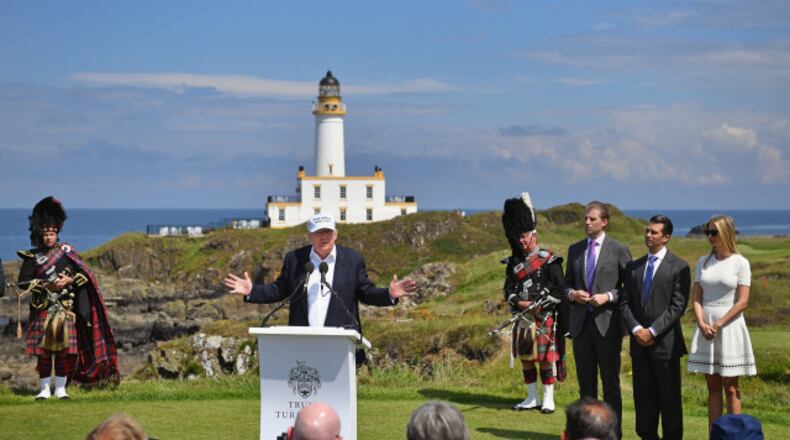Much of the political world scoffed at Donald Trump’s visit to Scotland to open a new golf course as a waste of time that would be better spent in Ohio, Florida and Pennsylvania.
Nonetheless, that bit of wholly private business in the middle of a presidential campaign put the presumptive Republican presidential nominee on the scene of a massive diplomatic earthquake, as Brits voted 52 to 48 percent to leave the European Union, with its immigration and financial woes.
Here's what Trump posted on Twitter. He was quick to draw the parallels to his own “America First” efforts.
Trump's remarks were interrupted by a man throwing golf balls painted with Nazi swastikas.
The US billionaire answered: said: "I think it's a great thing that's happened. It's an amazing vote, very historic.
"People are angry all over the world. They're angry over borders, they're angry over people coming into the country and taking over and nobody even knows who they are.
"They're angry about many, many things in the UK, the US and many other places. This will not be the last."
"Basically, they took back their country," Mr. Trump said Friday morning from Scotland, where he was promoting his golf courses. "That's a good thing."
… Even as the European Union began to grapple with a new and potentially destabilizing period of political uncertainty, the British vote also will inevitably be seized upon as further evidence of deepening public unease with the global economic order. Globalization and economic liberalization have produced winners and losers — and the big "Leave" vote in economically stagnant regions of Britain suggests that many of those who have lost out are fed up.
British Prime Minister David Cameron has resigned. Financial markets are wavering, and whether you agree with Trump could well depend on whether your 401(k) holds up over the next week. Yet while he was on the right island, in speaking from Scotland, Trump perhaps chose the worse venue possible from which to offer his congratulations.
Read your Shakespeare. Scotland has always had stronger ties with the European mainland. Centuries' worth of political leverage were found there. On Thursday, 62 percent of Scottish voters wanted to stick with the European Union, compared to 47 percent in England proper. And "taking back their country" means different things to different people. From the Washington Post:
Nicola Sturgeon, the leader of the Scottish National Party, said that a second referendum on Scotland's membership in the United Kingdom was a possibility in the immediate future.
"We will begin to prepare the legislation that would be required to enable a new independence referendum to take place if and when parliament decides," she told reporters in Edinburgh.
Just two years ago, pro-E.U. Scottish voters rejected independence and opted to remain united with England, Wales and Northern Ireland.
Here's how the world is reacting to the vote:
About the Author
Keep Reading
The Latest
Featured




